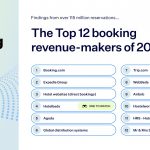From the immense amount of data that organisations receive, very few have the ability or the know-how to utilise it to their benefit.
NB: This is an article from AxisRooms
When an organisation tracks data to identify opportunities, minimise risks and optimise the way business is conducted, it is referred to as business intelligence. Extracting benefits out of a data set is not a skill every organisation has acquired, though, they may have automated the process of data collection and reporting, as well as data visualisation.
Subscribe to our weekly newsletter and stay up to date
They’re stuck in spreadsheet mode when it comes to decision support as business intelligence still remains on the periphery of the basics. Other than scheduling reports to be mailed to one’s inbox, BI tools are hardly put to good use. Users who are a bit more hands-on with BI tools also use it to increase their pace of discovery, but, often get entwined with explaining their findings to others who are not well-versed with the platforms.
While there are some steps taken in the right direction, there is plenty of room for improvement when it comes to leveraging the power of business intelligence tools. Let us delve a little deeper into this and another topic closely related to it, known as decision intelligence, in this article.
Decision Intelligence:
In simple terms, decision intelligence (DI) is the supporting element that helps business intelligence (BI) achieve its end goal, as mentioned above i.e. identifying opportunities, reducing risks and optimising the way business is conducted. DI plays the role of amplifying data science with social science, decision theory and managerial science.
Business intelligence and decision intelligence are more than technologies, they’re organizational capabilities. When culture, people and tools fall into place for an organization, data works to take it much further than it otherwise would. Let’s see how:
Hoteliers have access to a pool of information, commonly referred to as data. This data is gathered from their suite of software such as a PMS, Web Booking Engine, POS etc. There is market intelligence also available through third-party tools. However, when it comes to correlating information received from different sources, many organizations fall out. Data is unable to speak for itself unless expertise is applied to juxtapose, layer and sift through it to arrive at insights ready to be made use of in making business decisions. BI platforms can help in centralizing information to arrive at a holistic view of a business.Spreadsheets condition people to look at the information within the strict purview of certain predetermined aspects. They look at the same set of cells and the reports they form, over and over again, turning a blind spot for anything else. It, therefore, becomes second nature to use BI tools also for automating reports. Without a new perspective or a diversion from the conditioning that one is used to, organizations risk missing out on the threats and opportunities that may be hiding.During the pandemic, organisations and the teams within learnt to collaborate digitally amongst themselves. Project management portals like Slack, Asana and Sharepoint became popular in helping manage projects and communicate better. Yet, there isn’t a significant change in the way teams share data and insights, which leads to a loss of precious time in charting the pace and quality of projects. Analytics-powered digital collaboration platforms, where team members gather, communicate, exchange information, plan and track, make sense.Once all your data is put under one roof and your teams are able to share and collaborate, AI capabilities can help elevate your decision-making significantly by processing and evaluating historical and current data to arrive at the risks and opportunities at hand. It may not be possible to totally base all decisions on AI predictions just yet, but it can be a reliable guide in bringing focus to the areas that may otherwise go unnoticed.
Conclusion:
Technology that helps decision-makers will likely improve and evolve as the days pass. There will be more tools that support businesses in converting data into actionable insights. It is important, therefore, to build such a culture in every organisation, before it’s too late, to stay ahead of the competition.
Read more articles from AxisRooms
The post Decision Intelligence: Turning Hotel Analytics Into Action appeared first on Revenue Hub.
































